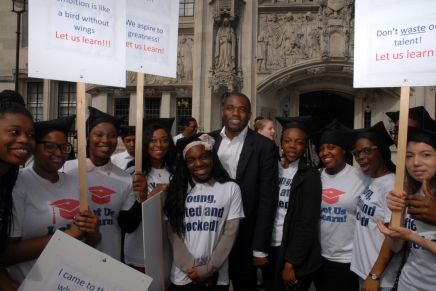Findings by campaign group Let us Learn show last year's 'Windrush scandal' has created a climate of fear among other groups of lawful UK migrants.
Read the Guardian's coverage of the new report
Today sees publication of a unique report by Let us Learn, based on interviews with young migrants who've grown up in the UK and are on the Home Office's 10-year 'limited leave to remain' path to being recognised as British citizens. Let us Learn is part of the children’s charity Just for Kids Law.
Interviewees in the report - 'Normality is a luxury: How limited leave to remain is blighting young lives' - describe young migrants' experiences of 'an unforgiving immigration system which sows division and fear, damages mental health, limits life chances and condemns even the hardest-working families to at least a decade of intense financial strain' (p5).
Interviewees in the research ranged in age from 19-24. All have lived in the UK at least half their lives and been here since primary school. The youngest came here age 2. The average age on arrival was just under 8. All the young people interviewed consider the UK to be home (p4).
They were each asked about their career ambitions (p8-11), which included working for the UN, scientific research, finance, law, psychology, and events management. Interviewees
spoke of fears that their prospects were were being blighted by the constant pressure of Home Office fees and the length and precariousness of the limited leave to remain process.
- Andrew, 24, in the UK since age 11, who has ambitions to be a lawyer, said his family lost their home after his mum had to choose between paying rent and putting money aside for his and his brother's leave to remain applications: 'After saving money towards Home Office fees, my mother was never able to become financially stable again, which led to various evictions later.'
- Agnes, 20, in the UK since age 4, with ambitions to be a space scientist, is juggling saving for her Home Office fees with funding herself through university, as her immigration status means she doesn't qualify for a government student loan (p20). Agnes is doing this through a combination of crowdfunding, working two part-time jobs during term time, and a series of private loans. Agnes is 'praying' she can pay off her loans using her part-time and holiday job earnings, in time to start saving for next year's tuition fees and her forthcoming limited leave to remain renewal. 'I worry daily about paying off my debts,' she says. Agnes acknowledges her university grades have suffered as a result of the time and financial pressures she is under.
Limited leave to remain is a form of immigration status granted to people with strong ties to the UK. It has to be renewed regularly with the Home Office over a 10-year period; and each application now costs £2,033, an increase of 238% since 2014. The spiralling cost is leaving many young people and their families struggling to afford to keep their 'lawful' immigration status, putting them in dread of becoming subject to the government's 'hostile environment', intended to target those with no legal right to be in the UK. It is only after maintaining their limited leave to remain for at least 10 years, that young migrants can apply to be finally recognised as permanently settled in the UK.
Another theme to emerge strongly from the interviews was the 'profound and unsettling' effect of the 2018 Windrush scandal on these young migrants (p15):
- Tosin, 22, who has lived in the UK for 12 years, and has ambitions to run an events company, said the Windrush scandal had left him 'scared and shocked'. Adding: 'If it happened to people who have every reason to think they are completely British, why can't it happen to me?' (p15).
- Ijeoma, 24, who arrived here age 5, and has ambitions to be a child psychologist, described feeling 'more scared' as a result of the scandal: 'Even though I am a legal resident, it feels like they can take it away any time. I'll wake up one morning and suddenly, they're like: "We don't want her any more!".' (p9)
The report calls on the new Immigration Minister* (name yet to be announced) to introduce urgent reforms, to make the limited leave to remain process fairer and more affordable. Recommendations include a five-year path to settlement for those in the UK more than half their life (instead of the current 10 years); and an end to rocketing Home Office fee increases (p26-27).
'Normality is a luxury' is based on detailed interviews with 14 young migrants, who are part of the Let us Learn campaign. The interviews were conducted by Dami Makinde, Let us Learn co-lead, and Zeno Akaka, Let us Learn project worker. The report was written by Fiona Bawdon, journalist and comms consultant to Let us Learn.
Chrisann Jarrett, the the young migrant who founded Just for Kids Law's Let us Learn campaign in 2014 said: “We set up Let us Learn because of the gross injustice facing young migrants who call the UK home. This important report exposes how spiralling Home Office fees and the length and uncertainty of our path to British citizenship is blighting our lives and having a devastating effect on young people's wellbeing and ambitions. We call on the new Immigration Minister to work with us to make the system fairer and more affordable."
www.letuslearn.study @letus_learn
Copies of 'Normality is a luxury' are available here: www.letuslearn.study/reports
For more information or to interview members of Let us Learn, contact Fiona Bawdon: fionabawdon@justforkidslaw.org; 07740 644474
Notes for editors:
- The cost of a limited leave to remain application has increased by 238% since 2014, and now totals £2,033 (which includes Home Office fees and the compulsory Immigration Health Surcharge). It has to be renewed every 30 months, which equates to nearly £70 a month. For a detailed breakdown of fee increases, see p13 of 'Normality is a luxury'.
- Limited leave to remain has to be regularly renewed with the Home Office, for a minimum of 10 years. Each renewal entails filling in a long, complex form and paying a substantial fee. After racking up 10 years of unbroken limited leave to remain, people can apply to be recognised as permanently settled here ('indefinite leave to remain'). A year later, they can apply to become British citizens, which involves paying a further fee and completing the government's 'Life in the UK' test. Many also have to take an English language test, even if the only language they speak is English. If limited leave to remain isn't kept up to date, an applicant loses their lawful immigration status, and could become subject to the government's 'hostile environment', losing their right to access essential services and at risk of removal to a country they no longer remember.
- Let us Learn was founded in 2014 by young migrant Chrisann Jarrett, and is part of the award-winning children's charity Just for Kids Law. www.justforkidslaw.org
- In September 2019, Let us Learn is due to spin off from Just for Kids Law into a separate autonomous organisation, We Belong - Young Migrants Standing Up. This will make it the first UK-wide campaigning organisation run by and for young migrants. www.letuslearn.study ; @LetUs_Learn . We Belong's website will be launched in September: www.webelong.org.uk
- Fiona Bawdon is a journalist and researcher, who has worked with Let us Learn since its launch in 2014. She wrote the report 'Chasing Status: If not British, then what am I?' (Legal Action Group, 2014), which first highlighted the issues that culminated in the 2018 Windrush scandal. https://www.lag.org.uk/about-us/policy/campaigns/chasing-status


